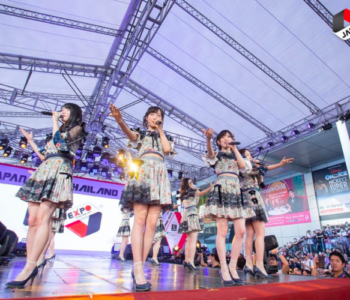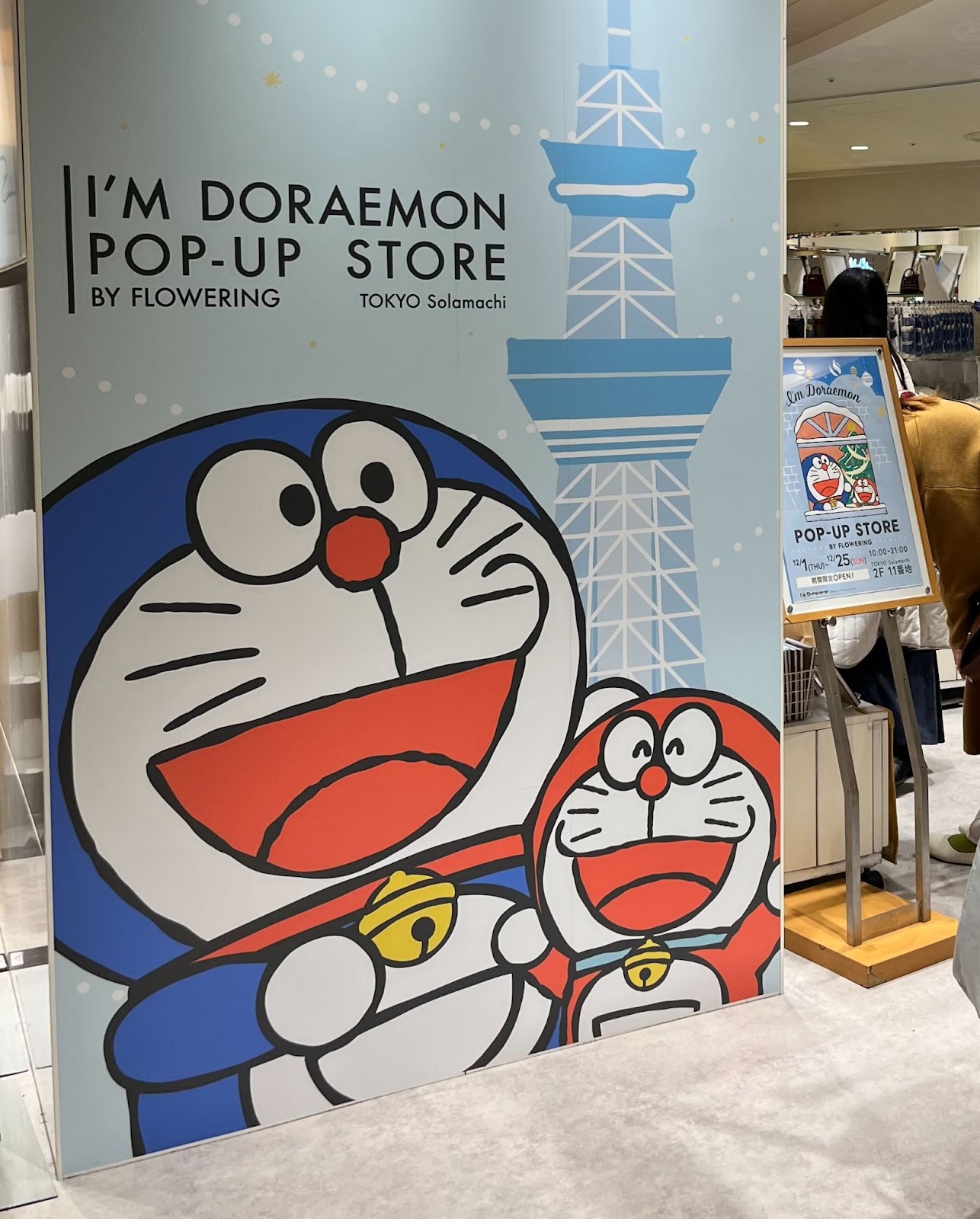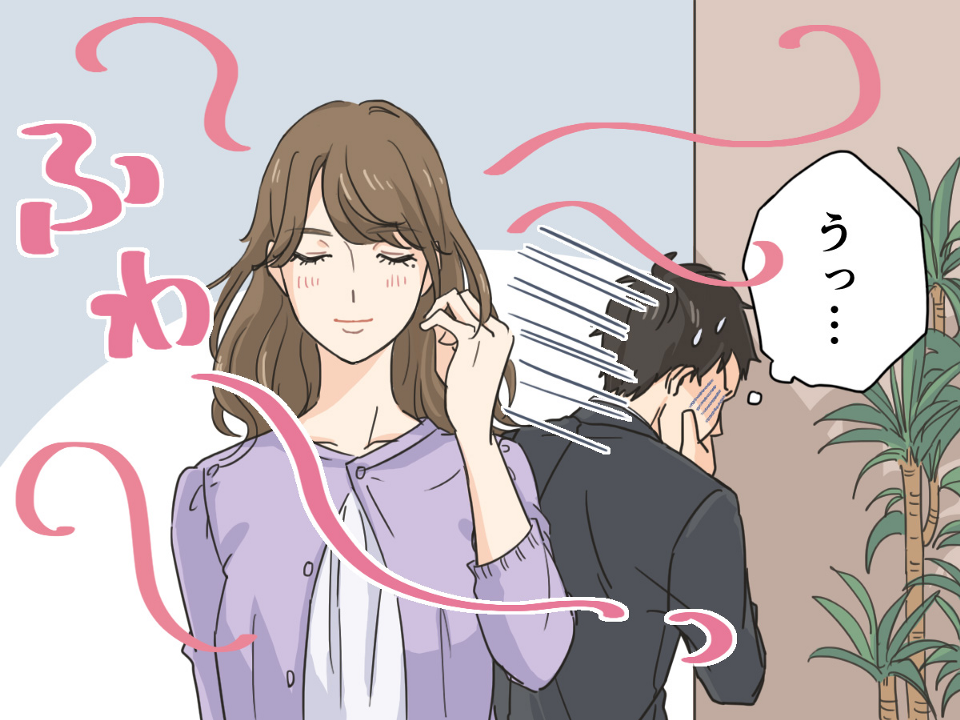 Industries
Industries
Keep your smells to yourself: ‘Smell harassment’ and the…
By Melissa Francis
Smell harassment, or スメハラ (sumehara) in its shortened form, is an expression that has swept across Japan and duly influenced the Japanese personal care industry. It refers to the act of inadvertently offending others with unpleasant body odours. Whilst the issue of being exposed to body odours in public spaces is certainly not unique to any particular locality, it is the core Japanese attitude of showing respect for others and not wanting to be an inconvenience that makes this an interesting area for personal care brands to explore.
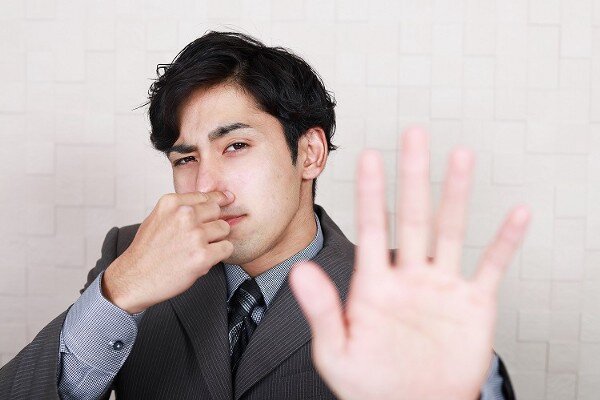
What does smell harassment mean within the context of Japan?
For some time, Japan had been a country unfazed by the requirement for personal deodorants and up until a few years ago, there wasn’t a lot of choice in shops at all. Still, smell harassment has quickly become a growing area of concern, and a number of Japanese consumers often say they are impressed by western deodorant products since they can provide what Japanese brands do not.
On the other hand, Westerners visiting or living in Japan have also commented that it is difficult to find a deodorant that neutralises their body odours effectively. Non-Japanese brands like Dove do especially well among Japanese consumers when it comes to deodorant, as they are soft on sensitive skin and are perceived as being more effective.
The use of the word ‘harassment’ in this term makes it sound like the person in question is actively aiming to invade someone else’s space, but ultimately Japanese people don’t intend to do this. It’s more about the perception that others consider bad odours to be a nuisance, and Japanese people are inherently averse to gaining the scorn of others. In the west, we might not be motivated by this to the same extent, though most would likely still prefer to smell approachable.
Despite a fundamentally keen emphasis on maintaining good personal hygiene, not everybody has the self-awareness to make a sound judgement on their own smell. It’s also unlikely that something like this would be pointed out for fear of sounding too critical or direct. Therefore, it’s up to individuals to ensure that they’ve taken measures to ‘smell-proof’ themselves. Marketing campaigns and insights from prominent Jaapnese personal care industry brands are helping to raise awareness of smell harassment.
Research has shown that Japanese people in their 20s are more likely to be put off by a bad odour, compared with those aged 40 or over (28% vs. 40%). Smell harassment is especially prominent within environments where people are in close proximity with one another, such as at offices or during a crowded train commute. It is also common for older Japanese men to emit an unpleasant smell, commonly referred to as ‘ojisan’ (old man) smell.
The reason smell harassment has become such a talked-about concept is because the context allows brands to communicate when action should be taken to eliminate distracting odours, and what can be done. Increasingly though, the issue is not solely focused on body odours. The term also includes other types of irritants that are perpetuated directly by human activity and that happen in tightly packed spaces, such as blowing second-hand cigarette smoke or wearing a strong, pungent perfume.
There has been a backlash on Japanese social media against strong-smelling fabric softeners and perfumes. News stories have surfaced about school children suffering from symptoms similar to hay fever, but not during hayfever season, and these have been attributed to the increase in scented products. On the one hand, there has been a heightened demand for fragranced personal care items, but on the other hand, many consumers are trying to escape the effects. It has become something of a battle between the two, which is why it is essential to achieve a balance.
These are the top Google searches in Japanese associated with sumehara:
- ijime (bullying)
- tabako (tobacco)
- wakiga (odorosis)
- saiban (judgement/trial)
- densha (train)
- koushuu (mouth odour)
- shokuba (workplace)
The most-searched result is ‘bullying’, which really says a lot. Nobody wants to be targeted by the people around them for being an odour offender, especially when they have the means to change the situation by using products that can address these problems.
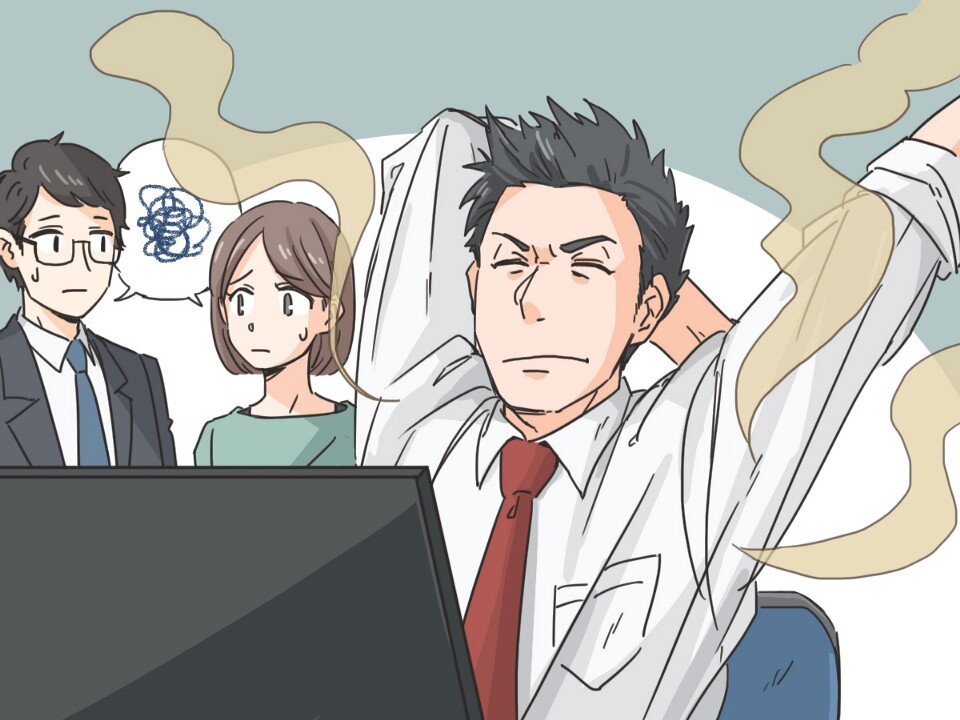
What are the latest trends in the Japanese personal care industry?
There are a plethora of personal hygiene products being released every month by the major manufacturers like P&G Japan, Mandom, Rohto and Kao. who operate a number of brands that cater towards many different demographics. There has been a significant upturn in the number of products claiming to effectively reverse invasive odors. The widening availability of these items helps to put the onus back on individuals to show respect by looking after their own hygiene first.
According to research carried out by personal care brand Mandom, the size of Japan’s deodorant market increased 1.2 times between 2013 and 2017 and purchases of direct application types have overtaken the previously common sprays.
Initial research conducted by Mandom in 2014 found that body and mouth odours were the top-ranking aspect people wanted their co-workers to manage. Since it is a sensitive topic, companies were having a difficult time speaking with employees about the issue, so Mandom started ‘smell management’ seminars to introduce techniques and products that could help. Rohto released a series of products under the ‘De Ou’ line. There are a total of nineteen items in the range, from body soap to shampoo and face wash. Sales of ‘De Ou’ products reached ¥2.3 billion JPY ($20.5 million USD) in 2017, which marked a 150% increase compared with 2013.
Here are a few specific innovations linked with targeting smell harassment:
Pure Kiss (by Limit Eight)
A number of mouth-odour neutralising supplements have been released in recent years. One example is Pure Kiss by Limit Eight. This is a daily supplement that uses the power of concentrated mushroom extract to rid the gut of gastrointestinal issues that can affect bad breath.
The product received a high satisfaction rating from consumers (94.5%) in the initial testing group and has been given solid reviews on Amazon Japan. For example, one consumer said she purchased it as a way to combat her husband’s bad breath and saw the convenience, so now uses it herself. Others have also cited the benefits using Pure Kiss has brought to their overall gut health and skin condition. It is primarily designed for use on dates or as a preparation for business meetings. Other similar supplements include; Kaorisetto, Deo-One, Niocare, and Frepure.
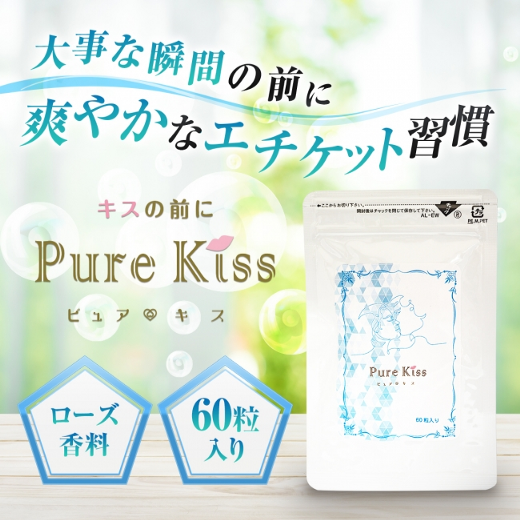
Biore Z (by Kao)
Kao’s Biore Z medicated deodorant was first released in 2017. It was born out of in-house research findings that 68% of employees felt stressed and unproductive at work due to others’ unpleasant body odours. The formula contains a sterilisation technology which prevents smells stemming from excessive perspiration while leaving the user feeling refreshed. The product is currently available in both a roll-on and gel format and can be used on the underarms and feet — the latter is particularly problematic when removing shoes during nomikai or when visiting people’s homes, which is expected.
Well-known TV personality Naomi Watanabe is the official brand ambassador for the women’s releases, lending a great deal of character to the promotion. The packaging is also decidedly colour-coded in order to differentiate between the men’s and women’s options (black and pink respectively).
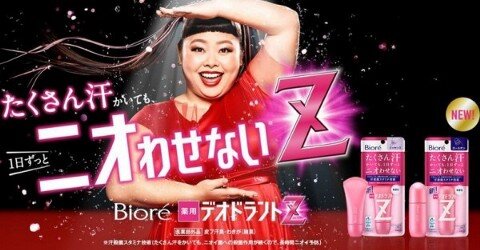
Targeting More Unusual Odours
Mandom has been a leading name in the development of products designed to target men’s body odours. A scalp spray was released in February 2019 under the company’s Lucido brand. This was a Japan-first formulation with active ingredients which help absorb sweat and sebum that could lead to undesirable smells.
Similarly, Shiseido released a powder-type deodorising spray as part of the Ag Deo 24 line-up, which features a proprietary technology called ‘ST Harmonage Perfume’. This works to minimise odours caused by stress hormones. Shiseido found that if left untreated, the release of these stress hormones can be accompanied by other undesirable symptoms such as anxiety and fatigue.
Guidelines on preventing smell harassment
As well as significant involvement from personal care brands, there are also a number of published guidelines on how to avoid falling foul of becoming a smell harassment perpetrator. Manga is an important educational tool for Japanese people of all ages, from elementary school students to office workers, and expertly demonstrates the emotional impact by encouraging a more visual connection with the subject matter. So it’s no surprise that ‘how-to’ books have been made available specifically on the topic of smell harassment.
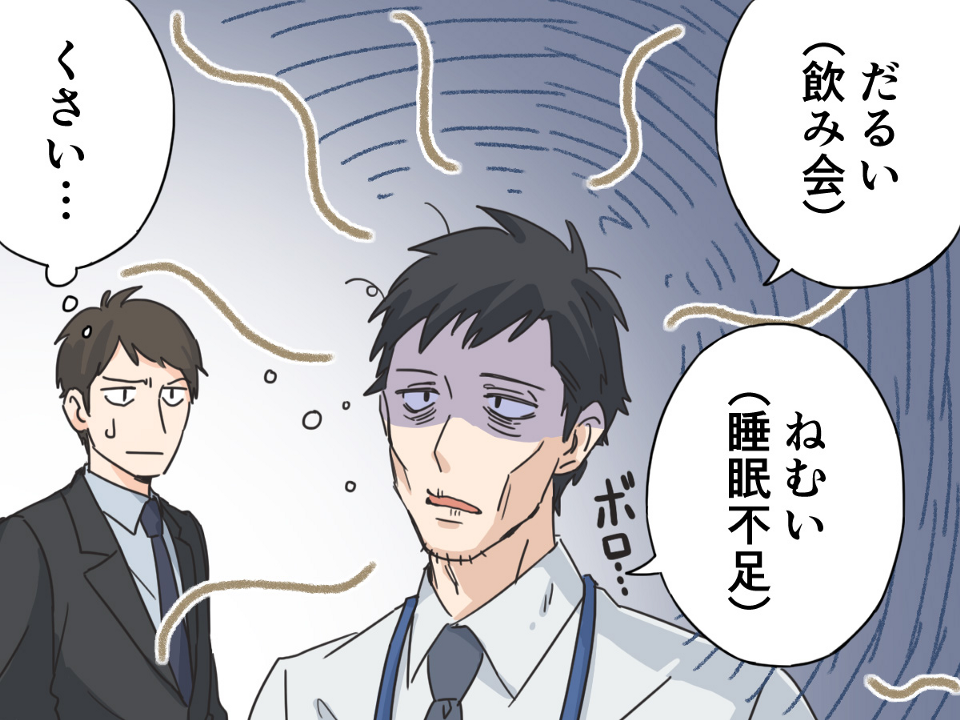
The above manga panel shows an office worker who appears to be worse for wear and suffering from a hangover. He is saying that he’s feeling lethargic after spending the previous night at a nomikai (drinking meetup, probably with clients or co-workers) and hasn’t had enough sleep because of it. Meanwhile, his colleague is preoccupied with how much these factors are making him smell terrible. This gets across the message that it’s important to consider others feelings and not only complain about one’s own situation.

On the other hand, this next manga panel shows a woman wearing perfume being blissfully unaware of the overwhelming scent she is emitting in the office. Her colleague is clearly affected by this strong smell and appears to be gagging in the corner.
But it’s not all about etiquette
Although Japan’s smell harassment discussion has tended to focus largely on avoiding unpleasant odours from the perspective of etiquette and decency, a growing number of brands are also highlighting the health benefits associated with good odour management. As much as being hygienic and fresh can increase one’s favorability with others, consistently monitoring body odours can make life easier all round.
Visits to Gorilla Clinic, a men’s cosmetic salon chain in Japan which has branched out substantially since 2014, primarily relate to resolving issues around sweat and odour control. One of the core treatments on offer is called MiraDry, the only non-invasive medical procedure to effectively use microwaves to reduce the sweat glands.
Thinking of selling your products into the Japanese personal care industry?
As we’ve explored in this post, odour prevention and good hygiene is incredibly important to Japanese consumers. Because of this, ‘smell care’ is an expanding market and this means there are plenty of opportunities for foreign brands to introduce solutions for some of the issues mentioned.
Tokyoesque can dig deeper to uncover what consumers really think about your products and provide insights on the industry as a whole. This will enable you to receive personalised recommendations on how to create a solid strategy. Contact us to find out how we can help!



